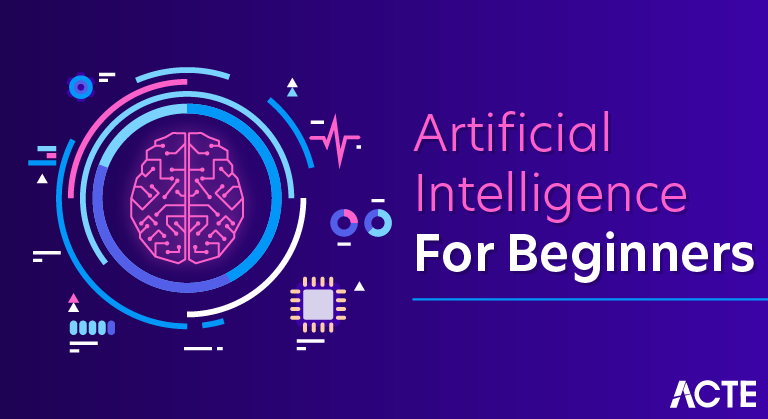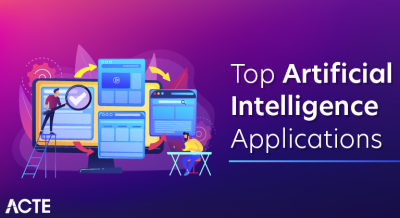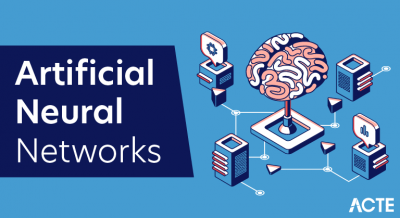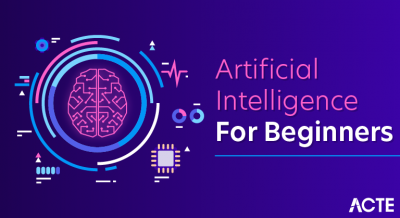
This Introduction to AI provides an overview of AI concepts and workflows, machine learning, deep learning, and performance metrics. You’ll learn the difference between supervised, unsupervised, and reinforcement learning; be exposed to use cases, and see how clustering and classification algorithms help identify AI business applications.
What will you learn in these artificial intelligence courses?
The main goal of this course is to familiarize you with all aspects of AI so that you can start your career as an artificial intelligence engineer. A few of the many topics/modules that you will learn in the program are:
- Basics of Deep Learning techniques
- Understanding artificial neural networks
- Training a neural network using the training data
- Convolutional neural networks and its applications
- TensorFlow and Tensor processing units
- Supervised and unsupervised learning methods
- Machine Learning using Python
- Applications of Deep Learning in image recognition, NLP, etc.
- Real-world projects in recommended systems, etc.
Who should take up this best Artificial Intelligence course?
- Professionals working in the domains of analytics, Data Science, e-commerce, search engine, etc.
- Software professionals and new graduates seeking a career change
Why should you take up this Artificial Intelligence training course?
- Today, Artificial Intelligence has conquered almost every industry. Within a year or two, nearly 80% of emerging technologies will be based on AI. Machine Learning, especially Deep Learning, which is the most important aspect of Artificial intelligence, is used from AI-powered recommended systems (Chat-bots) and Search engines for online movie recommendations. Therefore, to remain relevant and gain expertise in this emerging technology, enroll in Intellipaat’s AI Course.
- This will help you build a solid AI career and get the best artificial intelligence engineer positions in leading organizations.
Introduction to AI Course Curriculum
Eligibility
This Introduction to AI for beginners is ideal for developers aspiring to be AI engineers, as well as for analytics managers, information architects, analytics professionals, and graduates looking to build a career in artificial intelligence or machine learning.
Pre-requisites
There are no prerequisites for opting for this Introduction to Artificial Intelligence for beginners. It does not require programming or IT background, making it ideal for professionals from all walks of corporate life.
Artificial Intelligence Course Content
Module 01 – Introduction to Deep Learning and Neural Networks
1.1 Field of machine learning, its impact on the field of artificial intelligence
1.2 The benefits of machine learning w.r.t. Traditional methodologies
1.3 Deep learning introduction and how it is different from all other machine learning methods
1.4 Classification and regression in supervised learning
1.5 Clustering and association in unsupervised learning, algorithms that are used in these categories
1.6 Introduction to ai and neural networks
1.7 Machine learning concepts
1.8 Supervised learning with neural networks
1.9 Fundamentals of statistics, hypothesis testing, probability distributions, and hidden Markov models
Module 02 – Multi-layered Neural Networks
2.1 Multi-layer network introduction, regularization, deep neural networks
2.2 Multi-layer perception
2.3 Over-fitting and capacity
2.4 Neural network hyper-parameters, logic gates
2.5 Different activation functions used in neural networks, including relu, soft-max, sigmoid and hyperbolic functions
2.6 Back propagation, forward propagation, convergence, hyper-parameters, and over-fitting.
Module 03 – Artificial Neural Networks and Various Methods
3.1 Various methods that are used to train artificial neural networks
3.2 Perception learning rule, gradient descent rule, tuning the learning rate, regularization techniques, optimization techniques
3.3 Stochastic process, vanishing gradients, transfer learning, regression techniques,
3.4 Lasso l1 and ridge l2, unsupervised pre-training, Xavier initialization
Module 04 – Deep Learning Libraries
4.1 Understanding how deep learning works
4.2 Activation functions, illustrating perception, perception training
4.3 multi-layer perception, key parameters of perception;
4.4 Tensor flow introduction and its open-source software library that is used to design, create and train
4.5 Deep learning models followed by google’s tensor processing unit (tpu) programmable ai
4.6 Python libraries in tensor flow, code basics, variables, constants, placeholders
4.7 Graph visualization, use-case implementation, keras, and more
Module 05 – Keras API
5.1 Keras high-level neural network for working on top of tensor flow
5.2 Defining complex multi-output models
5.3 Composing models using keras
5.3 Sequential and functional composition, batch normalization
5.4 Deploying keras with tensor board, and neural network training process customization.
Module 06 – TFLearn API for TensorFlow
6.1 Using TFLearn API to implement neural networks
6.2 Defining and composing models, and deploying tensor board
Module 07 – Dnns (deep neural networks)
7.1 Mapping the human mind with deep neural networks (dnns)
7.2 Several building blocks of artificial neural networks (anns)
7.3 The architecture of dnn and its building blocks
7.4 Reinforcement learning in dnn concepts, various parameters, layers, and optimization algorithms in dnn, and activation functions
Artificial Intelligence Projects
What projects I will be working on during this AI online course?
Project 01: Image Recognition with TensorFlow
Industry: Internet Search
Problem Statement: Creating a Deep Learning model to identify the right object on the Internet as per the user search for the corresponding image
Description: In this project, you will learn how to build a convolutional neural network using Google TensorFlow. You will do the visualization of images using training, providing input images, losses, and distributions of activation and gradients. You will learn to break each image into manageable tiles and input them to the convolutional neural network for the desired result.
Highlights:
- Constructing a convolutional neural network using TensorFlow
- Convolutional, dense, and pooling layers of CNN’s
- Filtering images based on user queries
Project 02: Building an AI-based Chat-bot using IBM Watson LAB
Industry: Ecommerce
Problem Statement: Building a chat-bot using Artificial Intelligence
Description: In this project, by understanding the customer needs, you will be able to offer the right services through Artificial Intelligence chat-bots. You will learn how to create the right artificial neural network with the right amount of layers to ensure that the customer queries are comprehensible to the Artificial Intelligence chat-bot. This will help you understand Natural Language Processing, going beyond keywords, data parsing, and providing the right solutions.
Highlights:
- Breaking user queries into components
- Building neural networks with TensorFlow
- Understanding Natural Language Processing
Project 03: E commerce Product Recommendation
Industry: Ecommerce
Problem Statement: Recommending the right products to customers using Artificial Intelligence with TensorFlow
Description: This project involves working with recommended systems to provide the right product recommendation to customers with TensorFlow. You will learn how to use Artificial Intelligence to check for users’ past buying habits, find out the products that go hand-in-hand, and recommend the best products that can be bought together with a particular product.
Highlights:
- Building neural networks with TensorFlow
- Looking at huge amounts of data and gaining insights
- Building a recommendation engine with TensorFlow Graph





